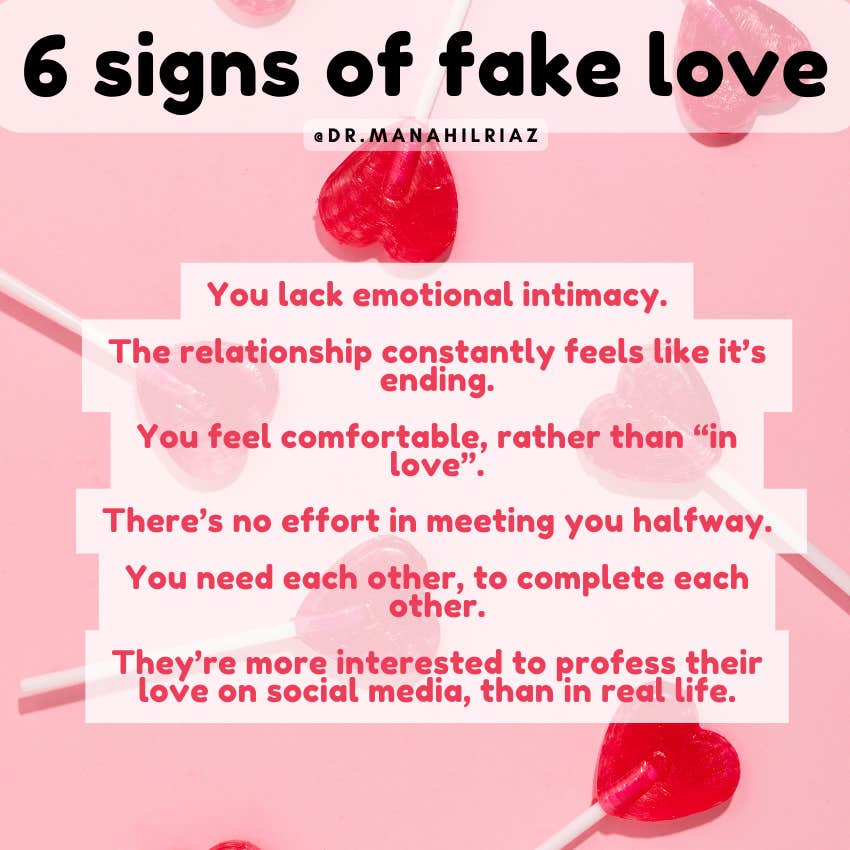6 SIGNS OF FAKE LOVE, ACCORDING TO A PROFESSIONAL WHO KNOWS
Protect yourself and your partner from a toxic relationship.
By Zayda Slabbekoorn

Navigating your love life can be incredibly difficult, whether you’re looking for a partner, actively dating, or in a long-term relationship. Sometimes, we overlook “red flags” or get complacent in ways that prove to be detrimental to the well-being of our connections.
So, how can we know when a relationship is built on fake love and not meant to be?
A professional shared 6 signs of fake love in relationships.
Dr. Manahil Riaz, the founder of Riaz Counseling — a mental health practice for people looking for resources, support, and guidance — has over 10 years of experience in the mental health support industry. Not only does she have extensive expertise in trauma, anxiety, and depression, but she also uses her social media platforms to create accessible reminders for viewers on self-care, relationships, love, and stress.
Dr. Riaz recently shared 6 realistic ways to spot “fake love” in your life. Each sign can serve as a reminder, either to your partner or you, to prioritize your relationship fitness, whether that means deciding to grow together or going your separate ways.

1. You lack emotional intimacy.
Oftentimes, especially in our first few romantic relationships, we mistake sexual intimacy for emotional intimacy. When we want to grow a relationship with someone, we forget that it’s not about just the physical aspects of our connection. It’s exactly the reason so many people end up in “situationships” or “friends with benefits” scenarios when originally they were searching for something serious, exclusive, and long-term.
It’s easy to get attached to someone when you’re with them physically, but a true and healthy relationship goes far beyond that. Emotional intimacy is still a “closeness” with another person, but instead of being superficial, it encompasses the “idea of being seen, known, and understood by someone else.” It’s a deep connection, one that you understand and know when you feel it.
Realizing you don’t have this kind of connection with your partner can be difficult to internalize, especially if you’re feeling gaslighted, misunderstood, or unsafe. If you’re actively trying to grow your relationship, consider going back to the roots — eat at your first-date restaurant, actively plan time together, and set an intention to reconnect every day.
2. The relationship constantly feels like it’s ending.
Feeling a sense of disconnect, mistrust, and fear in a relationship is something nobody wants to experience. When a relationship is ending, or constantly feels like it’s about to, it drains you.
Mentally and emotionally, that sadness continuously seeps into other areas of your life, making it impossible to grow, change, and thrive as an individual or a couple.
However, sometimes this feeling is subtle — your partner is gone for five extra minutes and you suddenly get anxious about where they are. They forget your birthday or misremember your favorite restaurant. They don’t whisper “goodnight” to you in the dark like they did for the first 10 years of your relationship.
These feelings culminate in a much larger feeling of resentment and will surely be the ultimate reason a relationship fails. So, make the decision — are you going to allow this relationship to naturally grow more toxic or make a change now?

3. You feel comfortable, rather than ‘in love.’
While it’s not an inherently bad thing to feel comfortable (and oftentimes it’s something we actively seek), comfort can quickly become complacency in a relationship. Instead of feeling butterflies, you feel annoyance. You’re falling into a routine with someone that’s void of any excitement, dates, or growth. It’s not healthy for anyone, whether in a relationship or not.
Of course, relationships evolve and change each day, and it’s inevitable that at some point you might feel stagnant with your partner. A Forbes article on complacency admitted this, providing three ways to “break this cycle” with your partner, assuming this is love you want to salvage.
“Create a gratitude loop with regular appreciation, show sincere and detailed appreciation, and surprise them with thoughtful gestures,” they advised.
4. There’s no effort to meet you halfway.
“If you don’t continue to grow with someone, you’re going to grow to resent them.” That’s the reality that author and podcaster Mel Robbins envisioned for couples that aren’t willing to compromise and meet their partner somewhere in the middle.
“When you’re in a relationship and someone else won’t work on it, what’s going to happen is … the one person willing to work on themselves will work themselves to a new level,” Robbins said. When they decide not to meet you halfway, forcing you to change at an unrealistic pace, they’re giving you ungenuine and fake love.
Not to mention, a lack of effort is a clear sign of disinterest. Who wants to be in a relationship with someone who is not as interested or invested as they are?
5. You need each other to complete each other.
Codependency in a relationship is much more serious than many are willing to admit. Not only are you building a flawed relationship foundation, one that crumbles upon the first sign of conflict, but you’re putting your well-being at risk.
Could you survive if your partner wasn’t around tomorrow? Is your confidence solely based on the validation of your partner? Do you lose sleep, miss opportunities, or put yourself in unsafe positions to appease your partner?
If you feel like any of those things ring true in your relationship, you might be experiencing some kind of fake love, whether that’s coming from your partner or you. Take some time alone to reconnect with yourself because it’s corny, but it’s true: you can’t love anyone else before you love yourself.
6. They’re more interested in professing their love for you on social media than in real life.
Lastly, Dr. Riaz pointed to the need for constant social media validation in a relationship as a signal of “fake love.” While it’s often fun to post your partner on social media and share with others in your life, it can turn detrimental when there’s a clear disconnect between the love you share online and in person.
“Real love doesn’t need likes or comments to thrive,” @mental_mindset_ on TikTok insisted, “it thrives on mutual respect, understanding, and commitment. [They] understand that what matters is not what others see, but what you share, when nobody is watching.”




